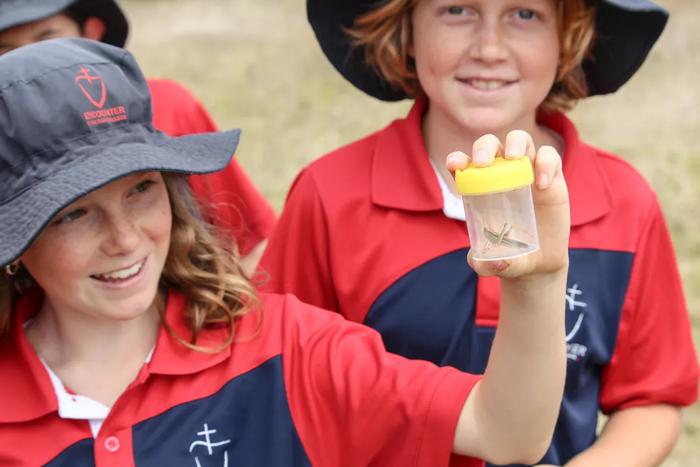Pro-environmental behavior is a growing area of interest in educational research, particularly when it comes to understanding how experiences in the classroom can shape students’ attitudes toward the environment. Recent findings from the University of Adelaide underscore the importance of hands-on learning through citizen science, specifically within the context of insect-related projects. Engaging students in discovering and studying insects not only enriches their educational experience but also equips them to become advocates for environmental conservation.
The research highlights a significant trend among students who participated in the “Insect Investigators” citizen science program. These students exhibited an increased intention to modify their personal behaviors in favor of environmental sustainability. The program, which encourages students to explore and document insect biodiversity, provides them with an opportunity to connect with real science in a meaningful way. As they delve into the complexities of insect life, students grow more aware of their environmental responsibilities, demonstrating their newfound knowledge and enthusiasm for protecting the natural world.
Dr. Erinn Fagan-Jeffries of the University of Adelaide offers insight into the impact of such programs. According to her, the students’ involvement in citizen science not only influences their attitudes but also has a ripple effect on their teachers. An interesting finding emerged where educators expressed a renewed commitment to integrating insect-related topics into their lessons. This suggests that student enthusiasm can significantly motivate teachers to incorporate more experiential learning opportunities into their curriculum, ultimately fostering a conducive environment for environmental education.
Beyond the classroom, citizen science projects associate students with real-world research endeavors, bridging the gap between theory and practice. The experiences students gain from interacting with scientists help demystify the scientific process and encourage them to think critically about the world around them. Educators report that these engagements lead to invaluable experiences that enhance both teaching and learning. The collaborative nature of citizen science invokes a sense of shared responsibility towards scientific understanding and environmental stewardship.
One of the key benefits of incorporating insect studies into educational programs is the opportunity to challenge existing misconceptions about insects. Insects are often perceived negatively, yet they play critical roles in ecosystems, contributing to processes such as pollination and nutrient recycling. By fostering positive human-insect connections, educators can help students appreciate the intricate web of life that sustains our planet, promoting greater empathy towards all living creatures.
Dr. Andy Howe, the lead author of the study, emphasizes that these initiatives are timely given the alarming rate of insect declines globally. With many species lacking formal documentation, there is a pressing need for increased research and advocacy. Insect-focused citizen science projects empower students to become informed contributors to conservation efforts, exemplifying how education can be a catalyst for change in environmental attitudes.
As the research suggests, the push for citizen science is not just about enhancing student knowledge in isolation; it serves as a platform for developing future scientists who will address significant gaps in our understanding of ecologies. The authors note that nurturing curiosity about insects among young people can lead to a generation ready to tackle pressing biodiversity crises. By empowering students with knowledge, we not only foster a respect for nature but also equip them with the tools necessary to engage in scientific inquiry.
The University of Adelaide and the University of South Australia are poised to play pivotal roles in shaping a new educational landscape with the formation of Adelaide University in 2026. The collaboration aims to enhance the quality of research and delivery of education while maintaining a focus on real-world relevance. This merger is expected to amplify the impact of citizen science projects and broaden their reach, enabling more students to engage with critical issues such as biodiversity and environmental sustainability.
In conclusion, the implications of this research extend far beyond individual classrooms. Citizen science projects can transform the educational experience by marrying scientific engagement with environmental activism. High school students participating in studies like “Insect Investigators” embody the potential to become stewards of the environment, equipped with the knowledge to influence change. Cultivating a new generation of scientifically literate individuals dedicated to conservation is crucial in addressing the multifaceted challenges posed by biodiversity loss and climate change.
As educational institutions continue to refine their approaches to teaching science, the evidence from the University of Adelaide’s study serves as a powerful reminder of the transformative power of engaging students in real scientific inquiries. By emphasizing hands-on experiences and fostering connections with the natural world, we can inspire a future where pro-environmental behavior becomes the norm rather than the exception.
Through these collaborative citizen science efforts, students not only learn about the environment—they become integral to its preservation. As custodians of the planet, their actions can help mitigate the biodiversity crisis we face today, proving that educational initiatives in citizen science are not just beneficial but essential to the health of our ecosystems and our future.
Subject of Research: Pro-environmental behavior increase among students due to insect-related citizen science projects.
Article Title: Engaging Students through Insect-Based Citizen Science Promotes Environmental Awareness
News Publication Date: October 2023
Web References: https://insectinvestigators.com.au/, DOI: http://dx.doi.org/10.1111/aen.70004
References: Study conducted by the University of Adelaide and University of South Australia
Image Credits: Encounter Lutheran College.
Keywords: citizen science, environmental education, insect conservation, biodiversity, student engagement, pro-environmental behavior, hands-on learning.




